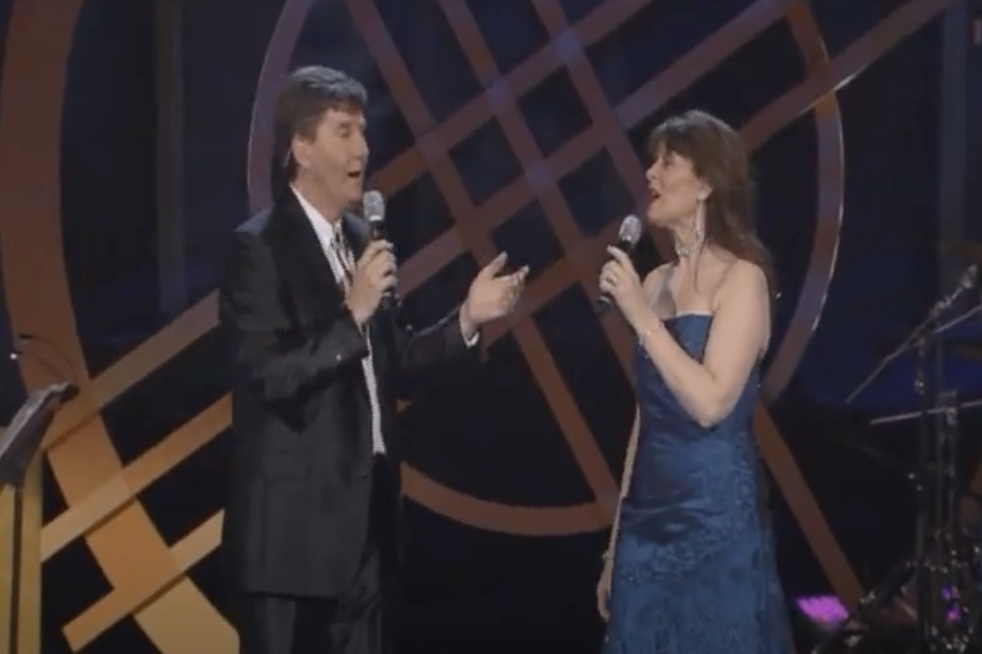
A Blossom of Melody: The Timeless Charm of “White Rose of Athens” by Daniel O’Donnell & Mary Duff
In the rich tapestry of music that spans cultures and decades, few songs carry the delicate grace and enduring appeal of “White Rose of Athens”, as brought to life by the beloved duo Daniel O’Donnell and Mary Duff. This enchanting rendition, recorded as part of their collaborative efforts, shines as a testament to their remarkable chemistry and shared passion for heartfelt storytelling through song. Though the exact release date of their version isn’t tied to a single standout moment—emerging from their extensive catalog of live performances and duet recordings—it likely found its way to audiences in the late 1980s or early 1990s, a period when both artists were deepening their roots in the Irish and country music scenes. For those of us who’ve journeyed through the years, this song offers a soothing balm, a melody that evokes memories of simpler times and far-off places.
The song itself has a storied history, originally composed by the renowned Greek musician Manos Hadjidakis in 1960 under the title San Sfirixis Tris Fores (“When You Whistle Three Times”). It gained international fame when Nana Mouskouri transformed it into Weiße Rosen aus Athen (“White Roses from Athens”) in 1961, with German lyrics by Hans Bradtke. The English adaptation, penned by Norman Newell in 1962, became “The White Rose of Athens,” a title that conjures images of blooming roses against the backdrop of an ancient city. For O’Donnell and Duff, taking on this classic was a natural fit, blending their signature Irish folk and country influences with a touch of European elegance. Their version, often performed live and captured in various concert recordings, reflects a significant event in their careers: the cementing of a musical partnership that has delighted audiences worldwide for decades.
Musically, “White Rose of Athens” in the hands of Daniel O’Donnell and Mary Duff is a gentle masterpiece. The arrangement typically features a soft acoustic guitar, perhaps layered with subtle strings or a piano’s tender notes, creating an airy, almost wistful soundscape. O’Donnell’s warm, velvety tenor pairs seamlessly with Duff’s clear, angelic tones, their voices intertwining like petals of the titular rose. This duet isn’t about flashy production—it’s about harmony and emotion, a hallmark of their work together. For an older listener, it might recall the lush ballads of the 1960s, when melodies carried a certain innocence and charm, yet it feels timeless, unmoored from any single era. Their live performances, often staged in grand venues or intimate theaters, bring an added layer of connection, as their voices fill the room with a sense of shared nostalgia.
Lyrically, the song is a tender farewell, a sailor’s promise to return when the white roses bloom again. “Till the white rose blooms again / You must leave me, leave me lonely,” it begins, weaving a tale of parting and hope against the backdrop of Athens’ sunlit shores. The imagery is vivid yet understated—roses carried by the wind, a ship sailing away—offering a universal story of longing that resonates deeply. Norman Newell’s words, sung with the sincerity of O’Donnell and Duff, transform it into a conversation between two souls bound by memory and promise. For those who’ve known the quiet ache of distance—whether across oceans or years—this song strikes a chord, its simplicity amplifying its emotional weight. It’s the kind of lyric that invites you to linger, to recall your own moments of waiting or reunion.
The late 1980s and early 1990s, when Mary Duff first recorded her solo version on the 1988 EP Amazing Grace, set the stage for this duet. Daniel O’Donnell, already rising as a star in Ireland and beyond after his 1983 breakthrough, found in Duff a kindred spirit whose voice complemented his own. Their collaboration on “White Rose of Athens” likely emerged from their frequent joint tours, a significant event in their shared legacy. While Duff’s solo take showcased her ability to carry a melody with grace, the duet with O’Donnell added a layer of richness, their voices blending in a way that feels effortless yet profound. This partnership, formalized over years of performances, has become a cornerstone of their appeal, especially for fans who cherish their wholesome, uplifting style.
For an audience seasoned by life’s chapters, “White Rose of Athens” holds a special place. It’s not a song that demands attention with loud crescendos or modern flair—it’s a quiet companion, a melody that feels like a letter from an old friend. Whether you first heard it on a vinyl record, a cassette from one of their early concerts, or a digital stream in 2025, it carries the same gentle magic. Daniel O’Donnell, now a cultural icon with over 36 years of charted albums, and Mary Duff, his steadfast musical partner, have made this song a bridge between their Irish roots and the wider world. Its inclusion in their repertoire speaks to their knack for choosing pieces that endure, that speak to the heart without pretense.
As we sit here on this April evening in 2025, reflecting on a song that’s traveled from Athens to Ireland and beyond, “White Rose of Athens” remains a gift. Daniel O’Donnell and Mary Duff have given it new life, their voices a reminder of music’s power to connect us across time and place. So, dear reader, if you’ve a moment to spare, seek out this rendition. Let its soft strains carry you to a sunlit shore, where white roses bloom and promises linger in the air. It’s a melody for the ages, sung by two voices that, together, make it unforgettable.
